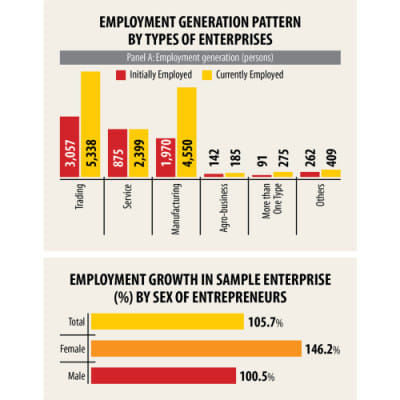SMEs with access to finance double employee numbers since inception

Small and medium businesses with access to finance have increased the staff size by more than 100 per cent from their starting level, playing a significant role in job creation and making the entire economy vibrant, according to a new research.
IDLC Finance and the Policy Research Institute (PRI) of Bangladesh jointly conducted the research titled "Access to Finance for SME and Impact on Job Creation: Empirical Evidence Based on IDLC Finance Ltd".
The research assessed a total of 782 small and medium enterprises (SMEs) which availed loans from IDLC Finance across the country and covered information from their inception to 2019.
There has been as much as 105.7 per cent growth in the employment generation by the SMEs, according to the study that was disclosed at a webinar jointly organised by the PRI and IDLC Finance yesterday.
Some 8.4 per cent of the SMEs were owned by females.They informed that they had posted job growth of 146.2 per cent since the inception of their businesses.
The SMEs owned by males, however, registered job growth of 100.5 per cent, meaning that they are lagging behind females when it comes to the expansion of businesses.
The SMEs, historically, have played a significant role in pushing growth for the developing economies, said Ahsan H Mansur, executive director of the PRI.
South Korea, Japan, China and many other developed countries had earlier managed their economic development by way of giving a boost to the SME sector, he said.
"And Bangladesh is no exception. The country will have to go forward based on the SME sector," he said.
The large industries are highly dependent on the SME sectors in different nations. But such interdependence is not that strong here.
Technology adaptation, use of skilled workforce and access to finance are highly important for the expansion of the SME sector.
"But, the SMEs are neglected to a great extent in the country. They will have to be brought under the global value system from the local one," said Mansur, also a former high official of the International Monetary Fund.
The importance of the sector does not any highlight in national dialogues, which is not expected at all, he said.
SMEs now occupy an important position in the national economy, accounting for about 45 per cent of manufacturing value addition, 80 per cent of industrial sector employment, 90 per cent of total industrial units and employment of about 25 per cent of the labour force.
Their total contribution to export earnings hovers in the range of 75 per cent to 80 per cent.
The industrial sector makes up 31 per cent of the country's gross domestic product, most of which is coming from the SMEs.
The country's SME sector has created 15 lakh jobs between 2009 and June 2014.
Business turnover at IDLC has been on the increase, playing an important role in keeping the wheels of the rural economy running as well, said Mansur.
IDLC SME division has been growing by around 21 per cent on an average for the past 10 years.
The non-bank financial institution's SME loans so far amount to 46 per cent of its Tk 8,700 crore outstanding credit as of October this year.
The board of directors of many banks have persistently showcased a reluctant attitude in disbursing SME loans, said Mansur, also chairman of Brac Bank.
The directors of some banks are taking loans from other banks through mutual understandings, putting an adverse impact on the SME sector, he said.
Many lenders are now unable to disburse the loans of the stimulus package initiated by the government for the SME sector, he said.
A lack of infrastructure for disbursing the loans is the main roadblock for the lenders, he said.
The central bank should hand over the responsibility of giving out loans to banks which are capable of it, Mansur said.
The rise in the volume of SME loans will not gain momentum unless the transparency of boards is ensured, said Arif Khan, managing director of IDLC Finance.
The NBFI started to give out loans in 2007 when many industry people argued that such financing options are highly risky, he said.
"But, we have got success by way of disbursing loans to the SME sector," he said.
Defaulted loans at IDLC Finance is below 3 per cent, much lower than the average non-performing loans in the NBFI sector.
NPLs in the 33 NBFIs in Bangladesh stood at Tk 8,905.62 crore in June, which is 13.29 per cent of the outstanding loans, according to data from the central bank.
Bazlul Haque Khondker, a professor of economics at the University of Dhaka, presented the research paper at the event.
Quoting the study, he said the highest employment growth was recorded in the service (174.2 per cent) and manufacturing (131 per cent) enterprises since their inceptions.
The highest growth rate of 134 per cent has been found for salaried jobs over the period.
This form of employment is more stable, creating a predictable income stream for the workers, Khondker said.

 For all latest news, follow The Daily Star's Google News channel.
For all latest news, follow The Daily Star's Google News channel. 



Comments